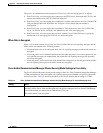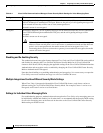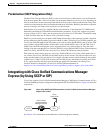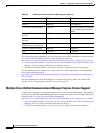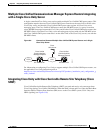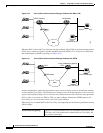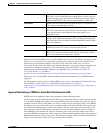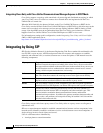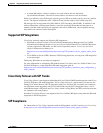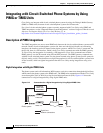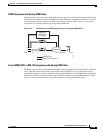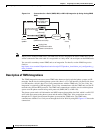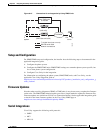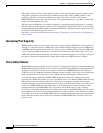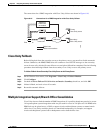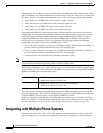
6-23
Design Guide for Cisco Unity Release 5.x
OL-14619-01
Chapter 6 Integrating Cisco Unity with the Phone System
Integrating by Using SIP
• A unique SIP address, which is similar to an e-mail address and uses the format
sip:<userID>@<domain>. The user ID can be either a user name or an E.164 address.
When a user initiates a call, a SIP request typically goes to a SIP server (either a proxy server or a redirect
server). The request includes the caller’s address (From) and the address of the called party (To).
SIP messages are in text format using ISO 10646 in UTF-8 encoding (like HTML). In addition to the
address information, a SIP message contains a start-line specifying the method and the protocol, a
number of header fields specifying call properties and service information, and an optional message
body which can contain a session description.
Supported SIP Integrations
Cisco Unity currently supports the following SIP integrations:
• SIP trunks to selected versions of Cisco Unified Communications Manager and Cisco Unified
Communications Manager Express. For a list of Cisco Unified
CM and Cisco Unified CM Express
versions supported as SIP trunks, see SIP
Trunk Compatibility Matrix: Cisco Unity and Cisco
Unified Communications Manager at
http://www.cisco.com/en/US/products/sw/voicesw/ps2237/products_device_support_tables_list.ht
ml.
• Cisco SIP Proxy Server (CSPS). However, CSPS is being phased out, so using it for a SIP integration
is not encouraged.
Third-party SIP trunks are currently not supported.
For more information on configuring SIP trunks between Cisco Unity and Cisco Unified CM or Cisco
Unified
CM Express, see the applicable SIP trunk integration guide at
http://www.cisco.com/en/US/products/sw/voicesw/ps2237/products_installation_and_configuration_g
uides_list.html.
Cisco Unity Failover with SIP Trunks
Cisco Unity failover is not supported with either the Cisco Unified CM SIP trunk integration or the Cisco
Unified
CM Express SIP trunk integration. If Cisco Unity failover is a requirement, you must use the
Skinny Call Control Protocol (SCCP) integration with Cisco Unified
CM. A customer can continue to
use SIP phones when integrating with Cisco Unified
CM using the SCCP integration. Once a call is
established between a SIP phone and Cisco
Unity, which is using Skinny, the RTP session between the
two endpoints will work properly.
Note that Cisco Unity failover is not supported for Cisco Unified CM Express using either the SIP trunk
integration or SCCP integration.
SIP Compliance
For information on Cisco Unity compliance with the SIP standard, see SIP Compliance for Cisco Unity
at
http://www.cisco.com/en/US/products/sw/voicesw/ps2237/prod_white_papers_list.html.



